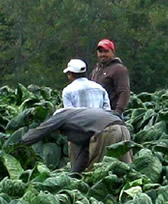|
|
October 2012
IN THIS ISSUE
- Truth, reconciliation, and equity work continues:
here’s how
- Women of South Sudan desire a life of dignity, sustainable peace, and development
- Another link was added to the Covenant Chain last month in Ottawa
- KAIROS accompanies Women’s Courts for Justice, Territory and Peace in Colombia
- KAIROS featured in CCIC online resource on Instanbul Principles
- Message to the ONIC
- How the Law Constructs Migrant Workers’ Insecurity
- Letter on human rights and security in Guatemala
-
The São Paulo Statement “International Financial Transformation for the Economy of Life”
- Our Vision: A fair and honourable future for refugee and immigrant families
FEATURE RESOURCE
SEEKING SHELTER:
A KAIROS Ecumenical Resource for four Advent Sundays
FEATURE PARTNER
José Sicajau
REFLECTION
'An Advent Psalm' by Ray McGinnis
Truth, reconciliation, and equity work continues:
here’s how |
KAIROS’ focus on Indigenous rights continues through 2013 and we invite you to journey with us.
If you’re just starting out, please take a look at our Truth, Reconciliation and Equity photo action. These pictures are an important public witness for all Canadians. The photos are being shared at national events and online.
|
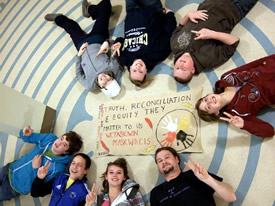 |
If you’ve already taken a photo (or even if you haven’t!), consider these next steps:
· Hold a workshop or right relations study. KAIROS and its member churches have many great resources to help you, including the very popular Blanket Exercise and a game show on the UN Declaration on the Rights of Indigenous Peoples. Don’t forget to tell us about your event!
· Attend a hearing or event linked to the Truth and Reconciliation Commission. These events are an extremely important opportunity to hear stories about the impact of residential schools, and to learn together what steps to reconciliation might look like. All Canadians are encouraged to attend. KAIROS posts these events to our website, and you can also look at www.trc.ca Resources on understanding residential schools and their impact across generations are available for you.
Northern Ontario and Québec are the focus of community hearings in late 2012 and into early 2013. In April, the Québec national event will be held in Montréal. Then the focus shifts to BC for the rest of 2013, and Alberta for 2014.
· Invite local First Nations, Métis or Inuit communities or organizations in your area to talk about their work and how you can support it.
· Meet with your Member of Parliament. In January 2013 KAIROS will be asking people to meet in groups with their MP, with a focus on Indigenous rights nationally and globally. Please watch for more details or get in touch.
Watch for other actions through the year.
Your support for this work is making a difference. Here’s one example: In Saskatchewan throughout 2012, people have organized themselves into ecumenical and interfaith groups to attend all of the roughly 20 TRC community hearings. This past June at the Truth and Reconciliation Commission national event in Saskatoon, Commissioner Wilton Littlechild addressed the thousands of people gathered and noted that for the first time ever, a national TRC event had roughly equal numbers of Indigenous and non-Indigenous people present. He explained that prior to Saskatoon, relatively few non-Indigenous people came to hear the stories that need to be heard and owned by all Canadians. In a moment of extraordinary generosity and compassion, the residential school survivors present rose and applauded their non-Aboriginal neighbours.
We have a long way to go. Many Canadians don’t realize that Indigenous health, community and youth organizations were hit with serious funding cuts in the 2012 federal budget. Globally and nationally, resource extraction operations are taking a heavy toll on Indigenous communities. Relationships that have been broken for over a century will not heal overnight, but without taking these first steps, together, we won’t see change. Whether through KAIROS, your faith community, union or workplace, please be part of that change. And please be in touch!
If you have any questions or ideas, please contact:
Julie Graham, Campaigns Coordinator for Dignity and Rights: jgraham@kairoscanada.org or 1 877 403 8933 x233
Katy Quinn, Interim Indigenous Rights Program Coordinator:
kquinn@kairoscanada.org or 613 235 9956 x224
Sara Stratton, Campaigns Coordinator for Sustainability, sstratton@kairoscanada.org or 1 877 403 8933 x241.
If you’d like copies of the new order form and campaign summary, you can find them here, or for print copies contact Anne Herteis at orders@kairoscanada.org or 1 877 403 8933 x243.
|
| |
Women of South Sudan desire a life of dignity, sustainable peace, and development |
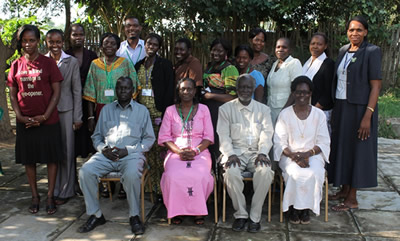
KAIROS funded partner, the Fellowship of Christian Councils and Churches in the Great Lakes and Horn of Africa (FECCLAHA) held a workshop with women representatives of the Sudan Council of Churches (SCC), another KAIROS funded partner, in Juba, South Sudan on the subject of the 2000 United Nations Security Council Resolution (UNSCR) 1325: The Role of Women in Prevention and Resolution of Conflict, Peace Building, and Post Conflict Reconstruction. UN SCR 1325 is the first ever resolution that specifically addresses the impact of war on women and children, specifically emphasizing the importance of women’s equal participation and full involvement in all efforts in maintaining and promoting sustainable peace and security.
The workshop reflected upon the three pillars of UN SCR 1325 which are protection, prevention and participation. Participants insisted that the government’s first and foremost duty is to provide security and protection for its citizens and called upon the Government of South Sudan to ensure that the rule of law and rights of women to protection and equality are respected.
Click here to read the full article. |
Another link was added to the Covenant Chain last month in Ottawa
|

At this year’s third annual Covenant Chain Link in Ottawa on October 19 & 20, participants learned about Indigenous peoples’ perspectives on education. This year’s theme, ‘A different Canada... begins with respect, relationships and openness to change’, was explored by participants in open space discussions facilitated by Algonquin Elder Albert Dumont, Métis Senator Lois McCallum, Inuit Elder Susanna Singoorie, Inuit rights activist Simona Arnatsiaq and Ottawa U Professor Joel Westheimer.
The keynote speaker, Francine Lemay, shared her journey of healing and reconciliation. Through the grief and loss of her brother, Corporal Marcel Lemay, who was shot during the Oka Crisis, Ms. Lemay has sought to uncover the truth in relation to this “crisis” and to build pathways of reconciliation with Indigenous peoples in Canada.
A great addition to this year’s event were spoken word performances by Indigenous youth and youth from refugee families which flowed from a workshop called ‘Sharing Our Truth’ that explored themes of truth and reconciliation.
The success of Covenant Chain Link is due in part to the diverse groups who come together to make it happen. Along with KAIROS, this year’s event was organized by Legacy of Hope Foundation, Ottawa Catholic School Board, Presbyterian Church in Canada, Project of Heart, Truth and Reconciliation Commission of Canada and The United Church of Canada.
Planning is already underway for next year – stay tuned!
For more info contact Katy Quinn at kquinn@kairoscanada.org or 613.235.9956 ext 224.
|
KAIROS accompanies Women’s Courts for Justice, Territory and Peace in Colombia |
KAIROS partner, the Popular Women’s Organization (OFP), and the Movement of Women against the War and for Peace, are leading a process to establish and implement the Women’s Courts for Justice, Territory and Peace in Colombia. These Women’s Courts are informed by over 30 international courts of opinion which have highlighted human rights violations against women and the need for justice globally. In Colombia, the courts provide a space for women to testify on human rights violations in the context of the decades-long domestic conflict. The courts are an example of an alternative justice system that draws attention to the impunity surrounding human rights violations against women, and to the fact there is no other place within the existing justice system for their testimonies and stories to be heard. In the Colombian context, the courts will focus on the right to justice, the recuperation of memory, the right to peace with social justice, the defense and conservation of land, and individual and collective reparations.
|
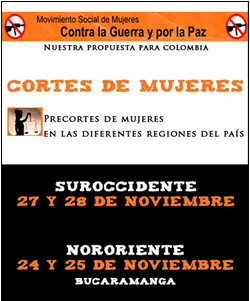 |
| In the lead up to a national Women’s Court in 2013, the OFP is organizing regional courts in Magdalena Medio, Bucaramanga (Nov 24-25) and in Cauca, Cali (Nov 27-28). As a long time partner, KAIROS has been asked to accompany these regional courts and to participate in a panel of international witnesses. Watch the website for blog postings and photos
For more information contact Rachel Warden, program coordinator Latin American partnerships and gender justice, rwarden@kairoscanada.org |
KAIROS featured in CCIC online resource on Instanbul Principles
|
The KAIROS Women of Courage (WoC) program is featured in the new CCIC (Canadian Council for International Cooperation) online resource on the Instanbul Principles for civil society (CSO) effectiveness. The eight Principles for CSO Development Effectiveness, the result of an extensive worldwide consultation process with thousands of civil society organizations, include: human rights, gender equality and equity, democratic ownership, environmental sustainability, transparency and accountability, equitable partnership, knowledge creation and mutual learning, and positive sustainable change. KAIROS has signed on to these principles.
Canada was quite instrumental in this process and the Canadian government recognized civil society as an independent development actor in the High Level Forum on Civil Society Effectiveness in Accra, Ghana 2007. However, Canada's current policies in international cooperation, a lack of transparency, and the exclusion of civil society from Canadian policy development clearly put the principles at risk.
The new CCIC resource is intended to provide concrete examples from a diversity of Canadian civil society organizations on how the Instanbul Principles are being implemented. The KAIROS WoC program is one of twenty case studies profiled in the resource that demonstrate innovative practices within the development and humanitarian sector as they relate to the eight principles. The article on WoC appears under Istanbul Principle 2 - Embody gender equality and equity while promoting women and girls’ rights.
|
The São Paulo Statement
“International Financial Transformation for the Economy of Life” |
The global ecumenical community has issued a strong call for the transformation of the world’s financial system. A statement calling for a new financial and economic architecture emerged from a conference attended by sixty delegates from Christian churches from every continent. The World Communion of Reformed Churches (WCRC) in partnership with the World Council of Churches (WCC) and the Council for World Mission (CWM) organized the gathering which took place in São Paulo, Brazil from September 29th to October 5th 2012.
Read the full article online
For more information please contact KAIROS Economic Justice Program Coordinator, John Dillon
jdillon@kairoscanada.org
416-463-5312 x 231
|
Message to the ONIC |
|
From October 8-12, 4,000 Indigenous leaders and elders met in Bogota, Colombia for the VIII National Congress of the National Indigenous Organization of Colombia (ONIC), under the banner “For the Consolidation of our Territories, the strengthening of autonomy and the guarantee of our fundamental rights.”
The ONIC is celebrating its 30th anniversary – 30 years of indispensable work for human rights and social justice under horrendous conditions of conflict, marginalization, discrimination and poverty.
Read the full article online
|
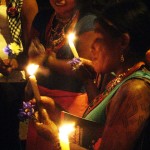
|
For more information please contact Latin America Partnerships Program Coordinator, Rachel Warden:
rwarden@kairoscanada.org
416-463-5312 x 242
|
How the Law Constructs Migrant Workers’ Insecurity |
KAIROS welcomes the Metcalf Foundation’s new report “Made in Canada; How the Law Constructs Migrant Workers’ Insecurity”, written by Toronto lawyer Fay Faraday and released on September 17, 2012. While the report focuses on migrant workers in Ontario, it offers a number of recommendations which, if implemented, would greatly improve the working and living conditions of migrant workers across the country by, among other things, ensuring that their labour and human rights are protected.
To read the full article please click here.
For more information please contact KAIROS Migrant and Indigenous Rights Program Coordinator, Alfredo Barahona:
abarahona@kairoscanada.org
416-463-5312 x 251
|
|
|
|

SEEKING SHELTER:
A KAIROS Ecumenical Resource for four Advent Sundays
“Las Posadas” is a Central American and Mexican Advent tradition in which Mary and Joseph walk through town searching for shelter. They are accompanied on their journey by local church members singing and carrying bright lanterns. Turned away again and again, they finally find householders who welcome them in. Today, that search for shelter is a reality for many in our world, whether the shelter people seek is fair wages, land rights, or clean water. What is our response?
Our Advent journey through Peace, Hope, Joy and Love can also carry us along on a search for justice and right relations. KAIROS invites you to an Advent search for that shelter in the spirit of Mary and Joseph’s journey.
Our Advent 2012 resource includes prayers, scripture commentary and litanies for all four Sundays in Advent, with a specific justice theme for each Sunday. It also includes instructions for lantern-making, slideshows, and action ideas for taking this justice journey beyond your church. We hope you and your faith community will also join in online sharing of your creative Advent ideas!
$10 for a print copy or $5 for a downloadable file, all copyright for group use included.
Order 'Seeking Shelter' Online >>
To order by email orders@kairoscanada.org
or call 1 877 403 8933 x243
FEATURE PARTNER
José Sicajau
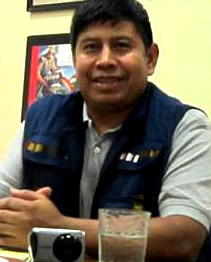
José at the KAIROS office, October 2012
José Sicajau is an Indigenous member of the Maya-Cachikel Nation in Guatemala. From 2003-2007 he participated in the “low skills” program of the Temporary Foreign Worker Program (TFWP) in Canada- a program introduced ten years ago as a “pilot project”. In 2007, José witnessed a Mexican co-worker being verbally and physically abused by their employer. José spoke out in defence of his co-worker and for this he was suspended from the program and repatriated to Guatemala. Since then he has not been “invited” to return to work in Canada.
José is only one of hundreds of workers who have been suspended or excluded from the program for speaking up to defend their rights. He and other workers came together to form the Guatemalan Association United for Our Rights, an advocacy organization known by its Spanish acronym, AGUND. The AGUND was formed to defend the human and labour rights of Guatemalan migrant workers.
José is visiting Canada at the invitation of Canadian NGO Inter Pares. The delegation includes Diego Lorente from the Guatemala-based Project Counselling Services and Fr. Juan Luis Carbajal, a Scalabrinian priest from Mexico. Both visited KAIROS on October 22, 2012 to share their stories and to build and strengthen a network of solidarity and collaboration with migrant justice advocates in Canada.
The delegates stress that the struggles facing migrant workers are global. They join KAIROS’ Canadian partners the Agricultural Workers Alliance (AWA) and MIGRANTE Canada in explaining to Canadians how the current and expanding federal migrant worker program is exploitive. Guatemalans like José also are asking Canadians to recognise that Canadian mining operations are among the factors pushing rural, poor and Indigenous communities off their land and into cities-- or into low-paid, high-risk migrant work.
While it is true that migrant workers who are abused by employers are very likely in the minority, the problem with the current program and related legislation is that they give workers far too few protections and leave them open to abuse or exploitation. This is unacceptable and not a reality that good employers support. It should be a pressing issue for all Canadians and workers.
Problems with the program reach beyond working conditions. Temporary migrant labour is effectively being privatized, as it is employer-driven and relies increasingly on the use of private recruiting agencies in Canada and in sending countries. Receiving countries like Canada are making it harder and harder for migrant workers to become landed immigrants. Migration is no longer seen as nation building, but rather as a revolving door to satisfy the needs of a fictitious labour shortage. Migrant workers are too often denied basic rights to fair wages, dignity, and safety-conditions no one should be forced to accept.
José, Diego and Juan Luis highlighted the importance of pushing receiving countries to sign the International Convention on the Protection of the Rights of All Migrant Workers and Members of their Families. “This international human rights instrument”, said the delegation “is an important tool to hold governments accountable in the protection of the rights of migrant workers.” No receiving country, including Canada, has signed the Convention.
If you want to learn more about migrant workers’ human rights and the struggles they face, have a look at the KAIROS website. Our new Advent resource, Seeking Shelter, includes a Sunday dedicated to migrant rights as part of its justice focus on Mary and Joseph’s journey.
For more information on this work, or to talk about hosting an interactive workshop on migrant justice, contact Alfredo Barahona, Migrant Justice and Indigenous rights program coordinator, at abarahona@kairoscanada.org
or
1 877 403 8933 x251.
Our Vision: A fair and honourable future for refugee and immigrant families
The Canadian Council for Refugees (CCR) Fall Consultation Our Vision: A fair and honourable future for refugee and immigrant families will be held in Toronto from November 29 to December 1, 2012. The gathering will explore the impacts of recent political changes on refugees and immigrants across Canada. With participation from all Canadian provinces and people involved in fields as diverse as health care and the law, the conference offers opportunities for professional development, networking and strategy on issues important to refugees and other newcomers to Canada. KAIROS is a member of the CCR.
The Consultation will include a special panel presentation open to the public called 'Strategies for Opposing Bill C-31'. It will be held on Thursday, November 29th at Church of the Holy Trinity, 10 Trinity Square, Toronto. All are welcome and admission is free.
Information about the CCR Consultation, workshop descriptions and online registration are available at: ccrweb.ca/meetings. KAIROS will be offering its popular Blanket Exercise during a workshop called Building Bridges: Dialogue Between Indigenous Peoples and New Canadians from 9:30AM to 12:00PM on Saturday, December 1st at the Hyatt-Regency Toronto on King Street.
Letter on human rights and security in Guatemala
The Americas Policy Group (APG), of which KAIROS is a member, wrote a letter to Minister Diane Ablonczy on the occasion of her visit to Guatemala, during the week of October 8. On October 4, just days before the Minister’s visit, 8 people were killed and 40 injured in Totonicapán when the military and police cracked down on a group of peaceful indigenous protesters. A few weeks earlier, on September 17, 30 people protesting against a mining company in Santa Rosa were arrested without cause and, earlier this spring, on May 1, a State of Siege was declared in response to protests over a hydroelectric dam.
The APG letter expressed concern about the recent killings in Totonicapán and the violent repression which has taken place in other regions of the country since President Otto Perez Molina took office in January 2012. Minister Ablonczy’s visit was intended to follow through on Canada’s commitment to foster security in Guatemala. The letter clearly states that the use of armed state forces to violently repress peaceful protest, and the lack of respect for civil liberties and human rights, including the right to Free Prior and Informed Consent (FPIC), are not contributing to increased security for the vast majority of the Guatemalan people. The APG and KAIROS believe that true security in Central America cannot be achieved until there is justice for current crimes, as well as the crimes of the past.
|
|









